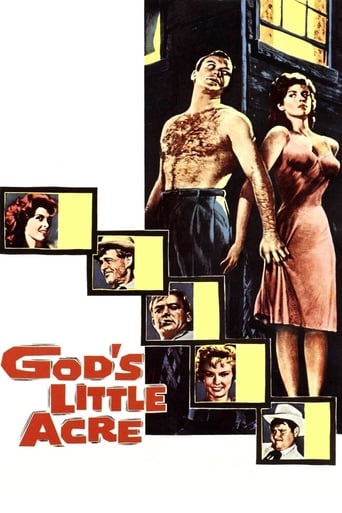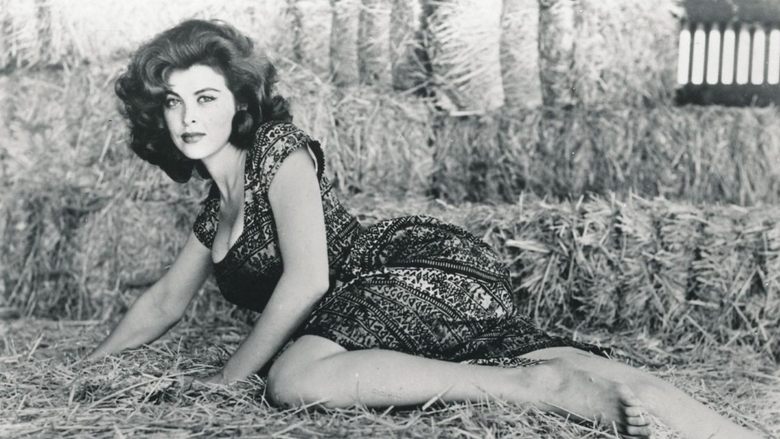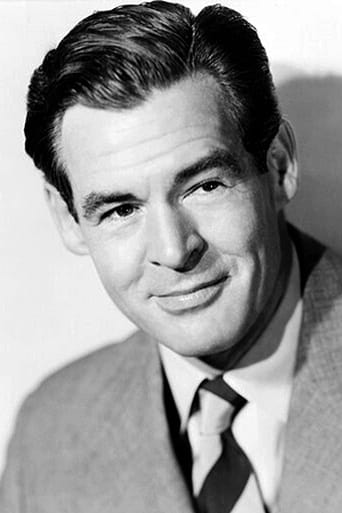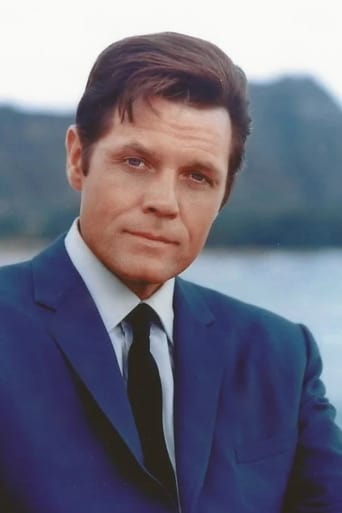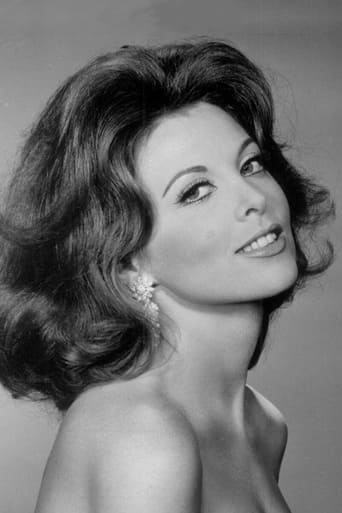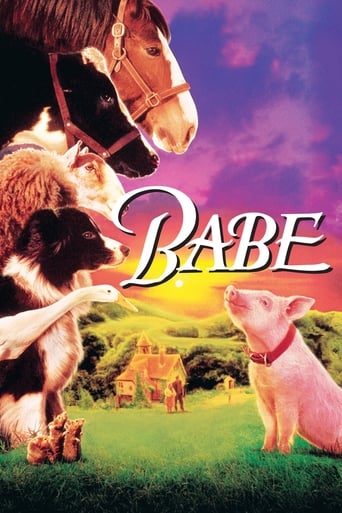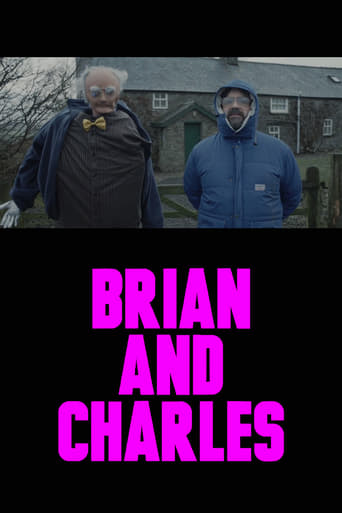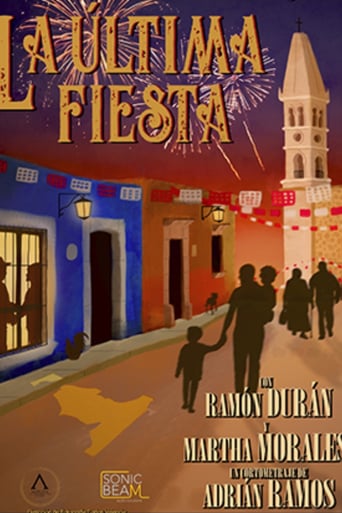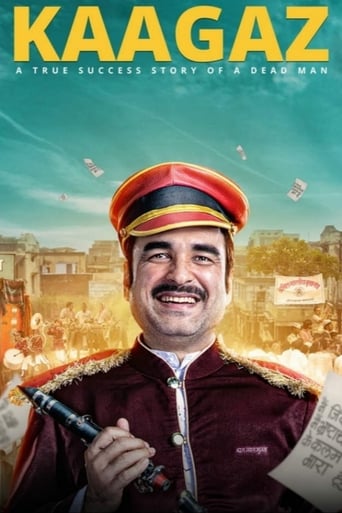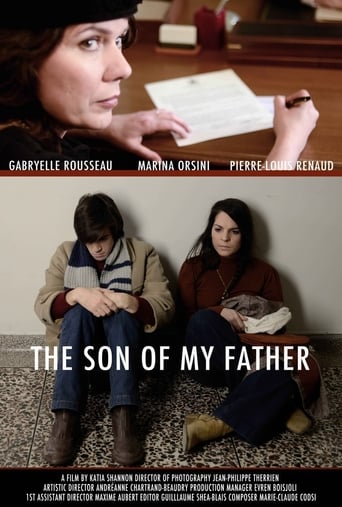God's Little Acre (1958)
In the 1950s, a poor Georgia cotton farmer and his sons search for the gold presumably buried on the farm by their grandfather but problems related to poverty, marital infidelity, unemployment and booze threaten to destroy their family.
Watch Trailer
Cast


Similar titles
Reviews
Very very predictable, including the post credit scene !!!
That was an excellent one.
If you don't like this, we can't be friends.
There's no way I can possibly love it entirely but I just think its ridiculously bad, but enjoyable at the same time.
My third Robert Ryan movie of the week was the 1958 cult classic "God's Little Acre." This film was based on an Erskine Caldwell novel of some 25 years earlier, a novel that was deemed controversially racy for its time, and the film itself must have been seen as a pretty sexy outing for its day. In it, Georgia farmer Ty Ty (Ryan) obsessively searches for gold on his land by digging deep holes all over his property. His two sons, played by Jack Lord and Vic Morrow, assist, while his daughter Darlin' Jill (Fay Spain) and daughter-in-law Griselda (Tina Louise, in her first film) act bored and randy in the background. Would-be sheriff Pluto Swint (Buddy Hackett) comes by to court Jill, while in another town, daughter Rosamund (Helen Westcott) has problems with her drunken husband (Aldo Ray), who only wants to turn on the lights of the closed-down cotton mill again. The farmhand played by Rex Ingram induces Ty Ty to hire himself an albino to divine the presence of gold on the land, and that albino (Michael Landon!) is found and does the job. Or does he? Anyway, all these various plot elements come together very nicely, and many moments of amusing humor and great drama are to be had here, not to mention those racy elements. If you thought Tina Louise was nice looking on "Gilligan's Island," you've got to get a load of her in this one! Let's just say that her sweaty cleavage is prominently highlighted throughout, and leave it at that. All the performers in that most impressive cast give wonderful performances, and director Anthony Mann (who apparently DID do more than create classic Westerns in the '50s!) helms in a masterful manner, abetted by the great Elmer Bernstein's score. In all, a surprisingly winning entertainment that--if not as daring today as it must have seemed back when--holds up very well for a modern audience. More than highly recommended!
Watched this yesterday on TCM. I had seen this 1958 adaptation of Erskine Calwell's controversial 1933 novel (he was actually arrested and tried for obscenity) many years ago when I was a young teenager, and not cared for it. Part of my distaste was undoubtedly due to my being a Southerner annoyed by the sexed-up Li'l Abner stereotypes.But watching it again after all these years, and in a different frame of mind, it strikes me as almost a minor classic, for all its many flaws. This can be credited to the direction from -- of all people -- Anthony Mann (surely this is the odd-man-out in his filmography) and photography by Ernest Haller. Despite the rural setting, most of the film takes place at night, with key scenes in a deserted cotton mill and on the street outside a honky-tonk beer joint during a trip to the "big city" (Augusta Georgia).This gives the film a noirish look that is superficially at odds with its Beverly Hillbillies characters, and adds to its unique ambiance. Because instead of noir cool we get raucous black comedy and wildly over-the-top caricatures. In fact, GLA is so flamboyantly larger than life that it comes across as a musical that has had all its songs cut.(Idea for you theatrical types. Get the musical rights to GLA. It seems to be crying out for an adaptation).Some of the casting is unsurprising: Jack Lord (in his butch leading man phase) and an already paunchy Aldo Ray as the hunks, Vic Morrow as Lord's loyal puppydog little brother (ironic since Morrow despised Lord -- allegedly they even got into a fistfight on the set).Tina Louise plays the supposed sexpot that the various males fight over. Since Louise never did anything for me (I was always a Mary-Ann man) she not only looks wrong but seems almost schoolmarmish in her repressed manner. Fay Spain is a lot more fun as the nymphomaniacal sister.Buddy Hackett plays a spoof of the fat redneck sheriff cliché. Rex Ingram is a friendly black sharecropper, Michael Landon has a small role as an albino (!!) and one Lance Fuller plays the rich brother from Augusta. He's the one cast member who makes no impact at all.The central role, Ty Ty the obsessed farmer, is played by the surprisingly cast Robert Ryan. Ryan is expert as psychos and villains, but he's not the first actor you'd think of for this kind of larger-than-life "fool" role, one that might suit Burt Lancaster or Jimmy Cagney better. However, he's generally quite effective, making up in gravitas what he might lack in esprit.The script by the blacklisted Ben Maddow (although credited to perennial front Phillip Yordan) has some exposition and other problems. One example. The film is more than half over when Ty Ty needs money and decides to borrow it from his son in Augusta -- a son we've never heard mentioned before. His existence should have been worked into dialogue earlier.Maddow's script seems divided in theatrical style scenes, often separated by fades to black. This may have been necessitated by heavy editing (censorship?). Scenes that you expect to see are curiously missing. DLA is essentially two plots fused together: Ty Ty desperately searching for gold on his farm, and Will Thompson (Ray) desperately trying to open the cotton mill that supports the town's workers.This latter, proletarian storyline seems added-on, a leftover from the novel's original publication in 1933. It ensures GLA a place in that group of films (A Place In The Sun, Lonelyhearts, The Film Flam Man, Fitzwilly) that are set in contemporary times but really should take place in the 1930s.Elmer Bernstein's score, full of pastoral horns and strings, is very good, even if it is the most blatant imitation of Aaron Copland I've ever heard. In fact it's so similar Copland fans may want to track it down for comparison purposes. The title song is an interesting gospel pastiche, although the use of an all-too-obviously lily-white chorus blunts its impact.I don't know where the auteurists rank GLA in the Anthony Mann canon, but it definitely deserves a look.
The Caldwell bestseller about a dysfunctional Southern family becomes an entertaining potboiler. The familiar cast features at least three actors who would go on to star in popular TV series (Louise, Lord, and Landon, the last playing an albino!). Ryan has a field day as the patriarch of the family, obsessed with finding gold on his land. Louise makes a lusty film debut as Lord's unfaithful wife. Her ample bosom gets so much screen time that it should have received no lower than third billing. Using gritty black and white, widescreen cinematography, Mann does an effective job of conveying the passion and the greed of these low-life characters.
For whatever reason the producer's decided that God's Little Acre should be set in no specific time rather than in the dust-bowl thirties where and when it belongs, it kept the film from being a great film. It's still a good film to watch, but it misses greatness by a length.Erskine Caldwell wrote this and set in firmly the Depression. And for rural America, the Depression did not begin when the stock market crashed. It began after World War I when the demand for our farm produce dropped with the coming of peace. Agriculture had no price support system then, it was the beginning of the end of the family farm, be it corn or cotton. The stock market crash just exacerbated the situation.But this Walden family has its own set of problems starting with the head of the family, Robert Ryan. As Ty Ty Walden, he's digging up the farm rather than working it, looking for some buried gold left from Civil War days. He's got three sons and two daughters and one fetching daughter-in-law, Tina Louise who is married to one son, Jack Lord, but has her heart set on her sister Helen Westcott's husband Aldo Ray.Before she was movie star Ginger Grant and a castaway, Tina Louise was quite the sex object, she's also got another son, Lance Fuller all hot and bothered over her. He's gotten away from his family of rustics, he married a wealthy widow who up and died and left him well fixed. Of course he has the least amount of character among the whole bunch.Jack Lord and Vic Morrow are the other sons. Lord in his days before he was telling Danno to book 'em played a lot of nasty types on screen. Here he's not nasty, but he's one powerfully jealous fellow. Fay Spain had a brief career as a young sex pot due to this film as the youngest in the family and one flirtatious young thing. This film was loaded with TV stars in the making. Michael Landon has a very nice part as an albino these rustics believe has special powers that can divine where gold is. He's captured by them and put to work tramping all over Ryan's acres looking for the buried gold. He's a true innocent that Fay Spain seeks to seduce while she's still being courted by Buddy Hackett who's a local politician running for sheriff. Michael Landon or Buddy Hackett? I mean, really, who would you choose?Though some of the left-wing polemics were drained from the film, this was the fifties, Anthony Mann still managed to get his cast to deliver a powerful and entertaining film. I will say this about the ending, the audience gets the message for sure about what's important in life, but it looks Ryan never will.

